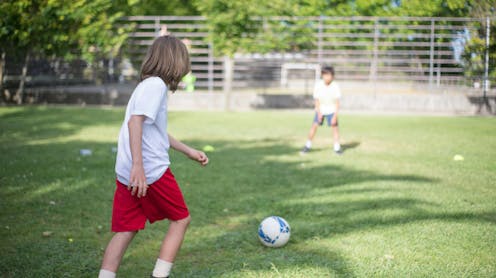No one knows why the nine-year-olds are dying. Chris Flynn’s novel invites us to question existence itself
- Written by Joanne Anderton, PhD candidate, Creative Writing, The University of Queensland

Chris Flynn’s latest novel, Orpheus Nine, explores the small-town fallout of a global catastrophe: something so inexplicably cruel that it forces its characters, and us, to reassess the very point of existence. How do you continue when it seems like all hope, like any chance for a future, is gone?
It’s Saturday morning in the rural Australian town of Gattan and the kids are playing football. Everything’s pretty normal. While the children play, the parents unofficially coach from the sidelines, when they aren’t sniping at each other, that is.
We meet Jess, whose nine-year-old son Tyler is excelling on the field; Dirk, whose ten-year-old son Alex is also playing, despite technically being a little too old for the team; and Hayley, whose eight-year-old daughter Ebony wishes she was old enough to play.
Review: Orpheus Nine – Chris Flynn (Hachette)
Then, at 11am, everything changes. The children stop playing. They stand stock-still, fear on their faces, and begin to sing a line from King Lear: “As flies to wanton boys are we to the gods; They kill us for their sport.” And then they die. Horribly.
That is, all the players except Alex. Only the nine-year-olds are affected by this terrible, inexplicable event. Helpless, Jess is forced to watch Tyler die. Dirk is spared that horror; Alex has, just a week ago, turned ten. And Hayley’s entire world is now steeped in dread, because it keeps happening.
Every morning since, on the day a child turns nine, they freeze, they sing and they die. No one knows why. And no one can stop it.
A supernatural tipping point
Orpheus Nine, or O9, as the event becomes known, is a supernatural tipping point in an already stressed and destabilised world. Its consequences are complex: a storm of social, political, religious upheaval. The novel never loses sight of these big-picture impacts, noting failures of supply chains, growing conspiracy theories and protests met with state violence. But it does so through the lens of the people of Gattan, so we experience their impact on a personal level.
This is a powerful narrative choice. The big picture tends to hold us at a distance — intellectually, we can appreciate what’s going on with governments and large-scale demographic changes, and draw parallels to the world as we know it. But emotionally, it’s the “small-picture” stories of day-to-day lives that affect us. The characters are what we connect to. Their heartbreak, their anger, their fear make O9 real for us.
Chris Flynn is doing something very specific with his imagined town and the characters who inhabit it. Using them, he explores individual and communal reactions to grief, across different genders, classes and life experiences. Each of the main characters feels like a “type” or a “trope”, but if you ask me, this is no accident. Flynn seems purposeful and self-aware when it comes to this use of archetypes.





